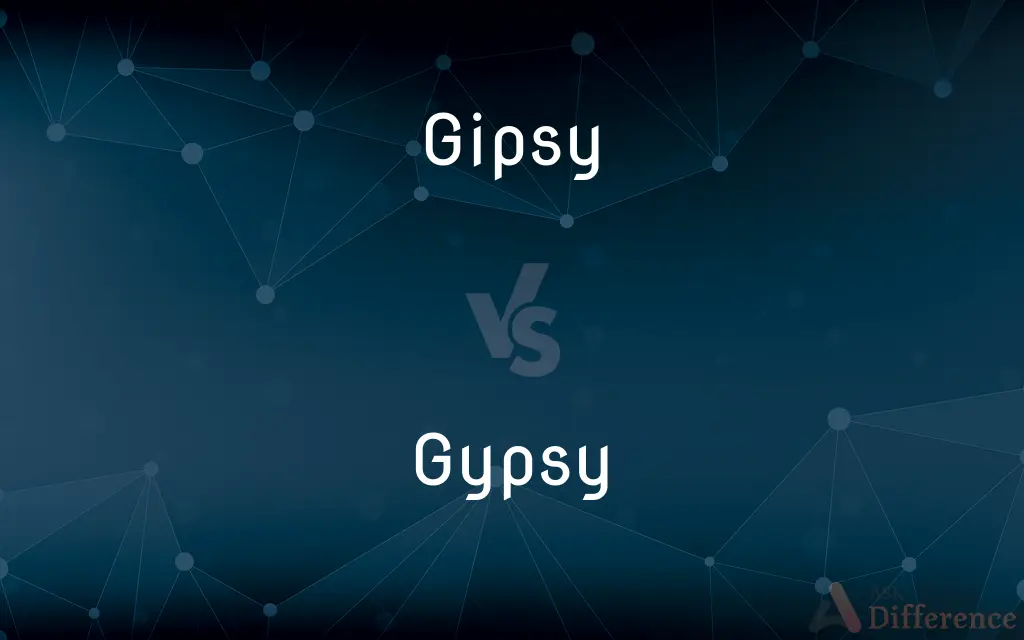Gipsy vs. Gypsy — What's the Difference?
By Fiza Rafique & Maham Liaqat — Updated on March 8, 2024
"Gipsy" is an alternative spelling of "Gypsy," both referring to the Romani people, a traditionally nomadic ethnic group. The term "Gypsy" is more common but can be considered pejorative.

Difference Between Gipsy and Gypsy
Table of Contents
ADVERTISEMENT
Key Differences
The terms "Gipsy" and "Gypsy" both refer to the Romani people, who originated from the northern Indian subcontinent and migrated to Europe around a thousand years ago. While "Gypsy" is the more widely recognized spelling in contemporary English, "Gipsy" serves as an alternative form. On the other hand, it's important to note that many people and organizations prefer terms like "Romani" to avoid the pejorative connotations historically associated with "Gypsy."
Historically, the term "Gypsy" was derived from the mistaken belief that the Romani people came from Egypt, leading to the usage of "Egyptian" and eventually "Gypsy." "Gipsy" follows the same etymological path but represents a less common spelling variation. Whereas the usage of "Gypsy" in literature and common language has solidified its prevalence, "Gipsy" appears more sporadically and is often seen in older texts.
In modern contexts, the use of "Gypsy" (or "Gipsy") without sensitivity to its historical baggage and the preferences of the Romani people themselves can be problematic. While "Gypsy" is embraced by some members of the Romani community, others reject it due to its association with discrimination and stereotypes. Conversely, "Gipsy" is not as frequently used in public discourse, potentially reducing its visibility but not necessarily its capacity to offend.
The preference between "Gipsy" and "Gypsy" varies geographically and culturally. In some English-speaking countries, "Gypsy" remains the standard term in both legal and social contexts, whereas "Gipsy" might appear in specific historical or literary references. The discussion surrounding these terms is indicative of broader conversations about ethnic identity, self-representation, and the power dynamics of naming.
Despite the differences in spelling, both "Gipsy" and "Gypsy" carry with them a rich history of the Romani people, including their arts, traditions, and contributions to the cultures of the countries they have lived in. The evolution of these terms and their usage reflects changing attitudes towards ethnicity, identity, and inclusion within society.
ADVERTISEMENT
Comparison Chart
Spelling
Alternative spelling of Gypsy.
More common spelling.
Connotations
Same as Gypsy, can be pejorative.
Often considered pejorative.
Usage
Less common, seen in older texts.
Widely used in contemporary English.
Preference
Used interchangeably with Gypsy.
Preferred term in many contexts, but usage is evolving.
Community Acceptance
Varies; some consider it outdated or pejorative.
Acceptance varies; moving towards more neutral terms like "Romani".
Compare with Definitions
Gipsy
Can carry the same stereotypes and misconceptions as "Gypsy."
The term Gipsy is often misunderstood and misapplied.
Gypsy
Commonly used but can be considered pejorative.
Gypsy is a term that some members of the Romani community reclaim.
Gipsy
An alternative spelling of Gypsy, referring to the Romani people.
The novel depicted the life of a Gipsy family traveling through Europe.
Gypsy
Preferred by some within the Romani community.
Some Gypsy individuals proudly identify with the term, emphasizing their heritage.
Gipsy
Usage varies by region and preference.
In some documents, Gipsy is used to denote ethnic identity.
Gypsy
Associated with stereotypes and discrimination.
The term Gypsy has been used derogatorily in many societies.
Gipsy
Sometimes used in historical or literary contexts.
Shakespearean studies discuss the portrayal of Gipsies in his plays.
Gypsy
Refers to the Romani people, noted for their nomadic lifestyle.
Gypsy culture is rich in tradition and history.
Gipsy
Reflects a complex history of migration and culture.
Gipsy music has influenced many genres worldwide.
Gypsy
Prominent in discussions of ethnicity and identity.
Gypsy rights are an important issue in human rights advocacy.
Gipsy
Variant of Gypsy.
Gypsy
(dated) A person with a dark complexion.
Gipsy
Alternative spelling of gypsy
Gypsy
(dated) A sly, roguish woman.
Gipsy
Alternative spelling of gypsy
Gypsy
See Romani.
Gipsy
See Gypsy.
Gypsy
The Romani language.
Gipsy
A member of a nomadic people originating in northern India and now living on all continents
Gypsy
A member of any of various traditionally itinerant groups unrelated to the Romani.
Gypsy
A part-time or temporary member of a college faculty.
Gypsy
A member of the chorus line in a theater production.
Gypsy
Alternative form of Gypsy: a member of the Romani people.
Gypsy
(colloquial) An itinerant person or any person, not necessarily Romani; a tinker, a traveller or a carny.
Gypsy
A move in contra dancing in which two dancers walk in a circle around each other while maintaining eye contact (but not touching as in a swing). whole gyp, half gyp, and gypsy meltdown, in which this step precedes a swing.}}
Gypsy
(theater) A member of a Broadway musical chorus line.
Gypsy
Alternative form of Gypsy: of or belonging to the Romani people.
Gypsy
(offensive) Of or having the qualities of an itinerant person or group with qualities traditionally ascribed to Romani people; making a living from dishonest practices or theft etc.
Gypsy
(intransitive) To roam around the country like a gypsy.
Gypsy
To perform the gypsy step in contra dancing.
Gypsy
One of a vagabond race, whose tribes, coming originally from India, entered Europe in the 14th or 15th century, and are now scattered over Turkey, Russia, Hungary, Spain, England, etc., living by theft, fortune telling, horsejockeying, tinkering, etc. Cf. Bohemian, Romany.
Like a right gypsy, hath, at fast and loose,Beguiled me to the very heart of loss.
Gypsy
The language used by the gypsies.
Gypsy
A dark-complexioned person.
Gypsy
A cunning or crafty person.
Gypsy
Pertaining to, or suitable for, gypsies.
Gypsy
To play the gypsy; to picnic in the woods.
Gypsy
A member of a nomadic people originating in northern India and now living on all continents
Gypsy
The Indic language of the Gypsies
Common Curiosities
Is the term Gypsy considered offensive?
Yes, it can be considered offensive due to its association with stereotypes and discrimination, though usage varies.
How did the term "Gypsy" originate?
It originated from the mistaken belief that the Romani people came from Egypt, hence the term "Egyptian," which evolved into "Gypsy."
What should one consider when using the terms "Gipsy" or "Gypsy"?
Consider the historical context, potential for offense, and the preferences of the Romani people themselves.
What is the difference between Gipsy and Gypsy?
The main difference is spelling; "Gipsy" is an alternative form of "Gypsy," both referring to the Romani people. "Gypsy" is more widely used.
How do "Gipsy" and "Gypsy" reflect the history of the Romani people?
Both terms reflect the complex history, culture, and experiences of the Romani people, including migration and contributions to local cultures.
Why do some people prefer "Romani" to "Gypsy" or "Gipsy"?
"Romani" is preferred by many for its accuracy and to avoid the pejorative connotations associated with "Gypsy" and "Gipsy."
What is the significance of the Romani people's nomadic lifestyle?
The nomadic lifestyle is a significant aspect of Romani culture and history, though not all Romani people are nomadic today.
Why is there a push towards using "Romani" instead of "Gipsy" or "Gypsy"?
Using "Romani" respects the community's preference and avoids the negative stereotypes associated with the other terms.
Can "Gipsy" and "Gypsy" be used interchangeably?
While they can be used interchangeably, sensitivity to the preferences of the people being referred to is important.
Are "Gipsy" and "Gypsy" used differently in legal or formal contexts?
Usage can vary; some legal and formal documents still use "Gypsy," but there's a trend towards more neutral terms like "Romani."
Share Your Discovery

Previous Comparison
Minimize vs. Minimise
Next Comparison
Client vs. CustomerAuthor Spotlight
Written by
Fiza RafiqueFiza Rafique is a skilled content writer at AskDifference.com, where she meticulously refines and enhances written pieces. Drawing from her vast editorial expertise, Fiza ensures clarity, accuracy, and precision in every article. Passionate about language, she continually seeks to elevate the quality of content for readers worldwide.
Co-written by
Maham Liaqat















































